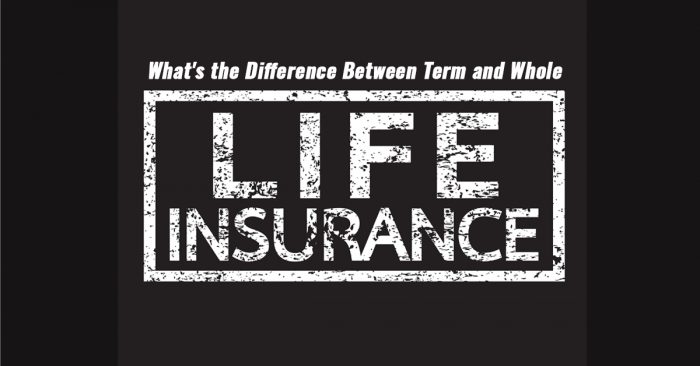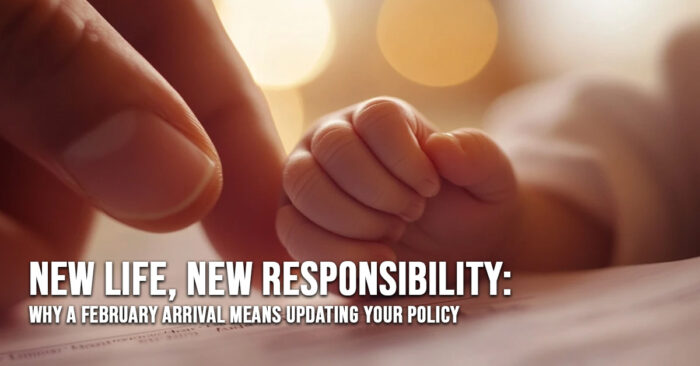What’s the Difference Between Term and Whole Life Insurance?

What’s the Difference Between Term and Whole Life Insurance?
Many of our decisions in life start by choosing one path or another. We can choose to rent the space we live in or buy a home. We can book a flight or drive to our destination. When it comes to life insurance, your path starts by understanding the basic differences between term life insurance and whole life insurance.
Term insurance covers the insured’s life over the course of a specific period. The term may be five years, 20 years, 30 years or anywhere in between. You may purchase a 30-year term life insurance policy to help ensure a mortgage is paid off in the event of a death. A young breadwinner may decide to take out a large amount of term life insurance to protect a young family, ensuring college will be paid for and the family’s lifestyle can continue. One of the biggest benefits of term insurance is that it is relatively inexpensive to acquire, especially at younger ages. The downside is that term insurance will expire at the end of the term and coverage will cease. There is usually no cash value build-up with a term life insurance policy.
Whole life insurance, or what is sometimes referred to as permanent insurance, will stay in force for as long as premiums are made in a timely manner. While it can be more expensive to purchase than term insurance, it has the added benefit of building up cash value over time. This cash value can be accessed through a policy loan, usually at a very attractive interest rate. The policy may also be “cashed-in” at some future date. The other benefit is that even if the insured were to become sick, even terminally, the policy can’t be canceled. Some families who have a challenge saving money will choose whole life insurance as a form of forced savings.
Generally speaking, term insurance is better for those with large financial responsibilities, who need to acquire a significant amount of coverage at an affordable price. This can include those with large incomes or large debts. It is also a way young families can cover mortgage, car, credit card and student loan payments in the event of the death of an insured, while also providing living expenses for those left behind. Whole life is often chosen for those who require less coverage and may also want to build “equity” in a policy.
So what’s right for you? Let’s discuss where you are in life and where you want to go. We can discuss any present life insurance you may have and what can be done to enhance it. Get the life insurance coverage best for your situation. Contact us today.
Do you have questions about your insurance? Find an insurance agent near you with our Agent Finder
Search All Blogs
Search All Blogs
Read More Blogs
The Mystery of the Plastic Baby: A Guide to Mardi Gras and the King Cake
Why is there a baby in the cake? Discover the history and traditions of Mardi Gras 2026 and the delicious mystery of the King Cake.
Let the Good Times Roll—Safely: Mardi Gras Liability for Your Business
Hosting a Mardi Gras party this Tuesday? Make sure your business has the right event liability and liquor coverage before the beads start flying.
The Business “Prenup”: Why Business Partners Need Life Insurance in February
Love your business partner? Protect your company with a Life Insurance-funded Buy-Sell agreement to ensure the business survives the unexpected.
Heading South? Insuring Your Mid-Winter Break Road Trip in February
Driving to find some sun this week? Check your roadside assistance and rental car coverage before you leave the driveway.
Spring Dreams, Winter Schemes: Updating Your Insurance Before Your Spring Renovation
Planning a Spring kitchen remodel? Learn why you need to call your insurance agent before the contractors arrive to ensure your project is covered.
Shadow or Spring? The Quirky Science and Folklore of Groundhog Day 2026
Will he see his shadow? Dive into the history and humor of Groundhog Day 2026 and why we still trust a rodent with our weather forecasts.
Stocked for Love: Protecting High-Value Valentine’s Inventory with Business Insurance
Is your Valentine’s stock protected? Ensure your business insurance accounts for the massive inventory surge happening in early February.
New Life, New Responsibility: Why a February Arrival Means Updating Your Policy
Welcoming a new family member this February? It’s time to move life insurance to the top of your to-do list to ensure your child’s future is secure.
Delivering Love: The Insurance Risks of Valentine’s Week Gig Work
Delivering flowers or chocolates for extra cash this Valentine’s? Make sure your car is actually insured for delivery work before you hit the road.
Tax Prep & Protection: Ensuring Your Home Office is Fully Insured for 2026
Prepping your taxes? Don’t forget to check your home office insurance. Your standard policy might not cover your professional gear or liability.









